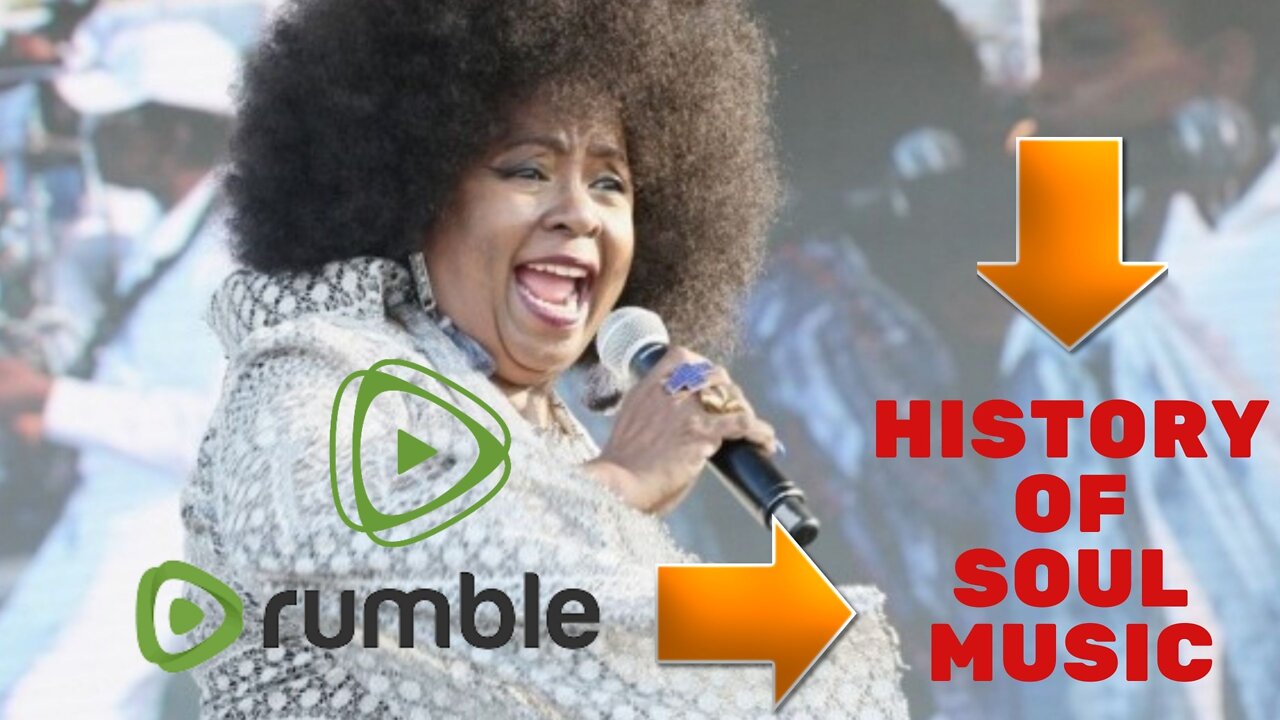Premium Only Content

👊🎤Brief history of soul music🎤👊
Brief history of soul music
The gospel revival and doo-wop merged into the great season of
soul music. Soul music was enabled by the commercial boom of "race"
music, that had led to the creation of channels and infrastructures
run by black enterpreneurs for black artists. This class of black
enterpreneurs hired and trained a generation of session musicians,
producers and arrangers (not to mention songwriters) who were specifically
meant to serve the needs of black music.
Soul music was also enabled by an unstoppable trend towards black and white
integration, as more and more white folks accepted the idea that black culture
was not evil or degrading, simply different (African instead of European).
The sociopolitical inroads made by jazz also helped legitimize black pop music with the white masses.
Soul music was also, indirectly, helped by rock music, precisely because rock music made white pop music sound so obsolete. Rock music buried white pop music but did not quite offer an alternative. On the other hand, rock music legitimized black pop music (rock music was basically a white version of rhythm'n'blues), and black pop music did offer an anternative to the Italian crooners and the likes.
As the civil rights movement staged bigger and bigger demonstrations and increased African-American pride, soul music became more than party music for young blacks: it became a rallying flag for the black nationalist movement. While never truly
political in nature, soul music's ascent in the pop charts came to represent one of the first (and most visible) successes of the civil-rights movement.
Soul music was born thanks to the innovations of a generation of post-war musicians who, essentially, turned gospel music into a secular form of art.
Soul music retained its vocals-driven image, typical of all pop music, but, like so much pop music, its hits became increasingly dependent on the skills of the arrangers and producers. In other words, soul music mutated transparently from a vocal style into a sound style.
This mutation took place mainly in four places: New York, Memphis, Detroit, Philadelphia. And it corresponded with four independent labels, respectively: Atlantic (founded in 1947 by white songwriter Ahmet Ertegun), Stax (founded in 1959 by white country fiddler Jim Stewart), Tamla Motown (founded in 1959 by black enterpreneur Berry Gordy), and, much later, International (founded in 1971 by Kenny Gamble and Leon Huff).
The sound of Atlantic was largely the invention of producer (and former critic) Jerry Wexler, hired in 1953. The peak of Atlantic's reign on soul music came when (1967) Wexler started working with arranger Arif Mardin and engineer Tom Dowd.
Former Philadelphia preacher Solomon Burke transferred the fervor of his sermons into the stirring rhythms of black dance music. Needless to say, his live shows became legendary for their delirious intensity, second only to James Brown. His material ranged from Virgil Stewart's Just Out Of Reach (1961), possibly the first country crossover by a soul artist, to Bert Berns' Cry To Me (1961), Gene Pitney's If You Need Me (1963), Alain Toussaint's Got To Get You Off My Mind (1964), Bert Berns' Everybody Needs Somebody To Love (1964), his own
The Price (1964), perhaps his vocal masterpiece, and Don Covay's Tonight's The Night (1965).
Soul music was, fundamentally, a consequence of rock music. The leadership went from the blacks (rhythm'n'blues) to the whites (rock'n'roll) back to the blacks (soul). Soul music was
everything that rock music was: dance music, personal expression, teenage angst, political rebellion. Rock'n'roll had stolen the body (the sound) of rhythm'n'blues, and soul music stole the soul (the spirit) of rock'n'roll.
From the musical viewpoint, the aesthetic priorities of soul music were rather different from those of blues music. The singer was still the center of action, but the arrangement (the ambience, the soundscape) was way more important than in rhythm'n'blues. The great
figures of soul music were, first and foremost, arrangers.
The mystical element of blues music was largely lost, replaced by sociopolitical awareness and a philosophical inquiry into the meaning of life; or simply by enjoyment of life. In many ways, one could claim that soul music was the result of black musicians adopting the European
stance about artistic matters: intellectual, creative, melodic.
At the same time, soul music introduced a new form of dancing: elegant, sensual and nonetheless primal.
🔴📌Credits: Piero Scaruffi 👊📣Research: Vitor hugo Lizardi Leonardi
👊💓->Hello friends, my channel was created with great affection to deal with a beautiful trajectory people who love music like me, and have in their heart that without it our life would not be so happy, so subscribe to the channel and help us spread more about music , Thanks in advance. 👊💓- The channel was created to promote texts and sounds for us to think a little about life and as we can be very happy with what little we have, did you like it, leave your LIKE, your comment as soon as possible we will reply, thank you. If any writer,record label, artist or photographer has a problem with any music upload or video, please contact us and we will remove your work immediately. Thank you!
👊💓 We strive to find the best and most enjoyable text and music for
you! We hope to make your days more beautiful with texts and music that make you think and music to relax! Text, love and music. I'm also a writer, I'm working on this project!
👊💓 If you have any copyright issues or questions, please don't let me know. report, please take the time to contact us via email and we will respond within 48 hours 🔴📣 vitorleonardi99@gmail.com 🔴📣
#music, #musicsoul, #musicblack, #gospel, #blacks, #musicians, #whites, #soul, #rock, #pop´, #blues, #movement, #afroamerican, #civil, #postwar,
-
 46:59
46:59
BonginoReport
4 hours agoTrump Outsmarts Criminal Activist Judge (Ep.161) - 03/17/2025
102K98 -
![🔴[LIVE] Market Open Update, Breaking News & Live Trading $1M || The MK Show](https://1a-1791.com/video/fww1/5b/s8/1/6/S/A/t/6SAty.0kob.1-small-The-MK-Show.jpg) LIVE
LIVE
Matt Kohrs
10 hours ago🔴[LIVE] Market Open Update, Breaking News & Live Trading $1M || The MK Show
2,000 watching -
 DVR
DVR
Dear America
14 hours agoTrump DECLARES Biden Pardons VOID + Deportations HALTED & ISIS Leader Taken Out!
70.2K49 -
 LIVE
LIVE
Wendy Bell Radio
6 hours agoYou Voted For This
13,097 watching -
 13:47
13:47
T-SPLY
3 hours agoDemocrats Hit The Lowest Approval Ratings In The History Of the Party
15.1K6 -
 1:02:28
1:02:28
Kyle Fortch
1 hour agoGrant Fisher: Producing Dustin Lynch's Country/EDM Set, Nashville's Biggest DJ | THE ONE SHEET S1E8
7.28K -
 14:36
14:36
Shea Whitney
1 hour ago $0.01 earned25 *Best-Selling* Amazon SPRING FASHION 2025!
5.17K1 -
 24:19
24:19
marcushouse
7 hours ago $1.18 earnedWhy Is Starship So Difficult to Get Right?
18.5K3 -
 13:22
13:22
Degenerate Jay
1 day ago $8.06 earnedSilent Hill F Looks Amazing - Is This The Future Of Silent Hill?
50.3K9 -
 19:29
19:29
Clownfish TV
1 day agoGamers Blamed for DOGE.
26.3K36